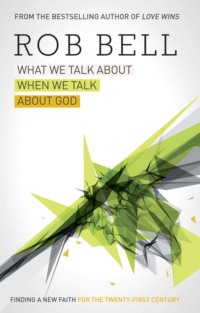
Полная версия
The Love Wins Companion: A Study Guide For Those Who Want to Go Deeper
Going Deeper by David Vanderveen
Citing the Lord’s Prayer, Rob connects “Your will be done on earth as it is in heaven” with the repeating promises in the Old and New Testaments that God is seeking partners to help move creation, so that it becomes a place where nothing competes with God’s will to eradicate injustice from the earth, where all creation is restored.
Recently Bono, lead singer of the band U2, was interviewed by Bill Hybels, pastor of Willow Creek Church in Barrington, Illinois, about bringing heaven to earth:
Hybels: I read somewhere that when you say the Lord’s Prayer, there’s one phrase that really grips you; which one is it?
Bono: “Thy kingdom come on earth as it is in heaven.”
Hybels: And why? Why does that one grab you?
Bono: Because a lot of people are happy with pie in the sky when they die, but I don’t think that is what, um, is our purpose. Our purpose is to bring heaven to earth in the micro as well as the macro. In every detail of our lives, we should be trying to bring heaven to earth. Have the peace that passeth understanding at of the center of yourself, but do not be at peace with the world because the world is not a happy place for most people living on it. And the world is more malleable than you think, and we can wrestle it from fools.[3]
The idea that heaven is not a place out there that we will arrive at some day, but a reality we encounter now is at the heart of what Rob is writing about in Love Wins. How do we “bring heaven to earth,” as Bono enjoins us? For many, being so steeped in an old model for heaven, this idea of heaven takes some getting used to. To help, we have included a Bible study on the heavenly visions from Isaiah, showing just how earthly these visions were.
Another teacher who helps us with this project is Bible scholar and bishop N. T. Wright. In an excerpt from a forthcoming book, How God Became King, Wright explains how seeing Jesus as teaching primarily about how we can get to heaven is one of the main reasons we cannot see the main story and themes of the Gospels.
Our ideas have consequences, and our beliefs about the last things shape how we live. If we want to participate actively in the ordering of creation with God (see Rev. 20), we must embrace a new idea of what heaven is and how close it is to our lives right here, right now.
Bible Study: Earthly Heavenly Visions
Once we remove our filters that only allow us to see heaven as a place we go to after leaving this world, we are then able to rediscover the rich narratives of the heavenly yet earthly future visions of the prophets. A selection of passages from Isaiah are listed below. As you read these selections, notice the following: Where is God dwelling? Who is present there? What animals and things are listed as present? What are concrete signs that the day of the Lord has arrived? How do these images fit with how you think of heaven?
In the last days
the mountain of the LORD’s temple will be established
as the highest of the mountains;
it will be exalted above the hills,
and all nations will stream to it.
Many peoples will come and say,
“Come, let us go up to the mountain of the LORD,
to the house of the God of Jacob.
He will teach us his ways,
so that we may walk in his paths.”
The law will go out from Zion,
the word of the LORD from Jerusalem.
He will judge between the nations
and will settle disputes for many peoples.
They will beat their swords into plowshares
and their spears into pruning hooks.
Nation will not take up sword against nation,
nor will they train for war anymore. (2:2–4)
The wolf will live with the lamb,
the leopard will lie down with the goat,
the calf and the lion and the yearling together;
and a little child will lead them.
The cow will feed with the bear,
their young will lie down together,
and the lion will eat straw like the ox.
Infants will play near the hole of the cobra;
young children will put their hands into the viper’s nest.
They will neither harm nor destroy
on all my holy mountain,
for the earth will be filled with the knowledge of the LORD
as the waters cover the sea. (11:6–9)
On this mountain the LORD Almighty will prepare
a feast of rich food for all peoples,
a banquet of aged wine—
the best of meats and the finest of wines.
On this mountain he will destroy
the shroud that enfolds all peoples,
the sheet that covers all nations;
he will swallow up death forever.
The Sovereign LORD will wipe away the tears
from all faces;
he will remove his people’s disgrace
from all the earth.
The LORD has spoken. (25:6–8)
You will go out in joy
and be led forth in peace;
the mountains and hills
will burst into song before you,
and all the trees of the field
will clap their hands.
Instead of the thornbush will grow the juniper,
and instead of briers the myrtle will grow.
This will be for the LORD’s renown,
for an everlasting sign,
that will endure forever. (55:12–13)
Discussion Questions
1 Rob remembers his grandmother’s painting of heaven as a floating, glimmering city. What is your vision of heaven? What factors have shaped this vision?
2 How does the perception of our lives and our church change when we think of heaven as a restored earth rather than as a faraway place?
3 If Jesus consistently focused on heaven for today, why do we so emphasize heaven after we die?
4 Rob describes the Christian life as our preparation to become the kind of people who can dwell in heaven. How does this reorient how we shape our lives?
5 What is the connection between our understanding of heaven and how we live our lives?
6 In Matthew 19 when the rich man asks Jesus about “eternal life,” what do you think the man had in mind? What might Jesus mean by the term? What does “eternal life” mean to you?
7 If to “reign” with God means to “participate” with him in his creation, how might this inform our understanding of our calling in this life?
8 What does it mean that “eternal life” is available to us right here, right now?
Reading Going to Heaven? by N. T. Wright
Rob argues that we misunderstand what Jesus meant by “eternal life”; it is not, he says, simply code for going to heaven after we die. In his forthcoming book, How God Became King: The Forgotten Story of the Gospels (HarperOne), leading New Testament scholar N. T. Wright maintains that we have missed the central theme of the Gospels, because we have projected our own themes onto the text to explain what Jesus’s main teaching was. One of the misinterpretations he writes about is the idea that Jesus was primarily concerned with who goes to heaven and how (and who does not).
What have the churches normally done with “the middle bits” [of Jesus’s life, the time between his birth and his death]? I have on occasion challenged groups of clergy and laity to tell me what they, or their congregations, might say if asked what “all that stuff in the middle” was about. What was the point, I have asked, of the healings and feastings, the Sermon on the Mount and the controversies with the Pharisees, the stilling of the storm and Peter’s confession at Caesarea Philippi, and so on and so on—all the mass of rich material that the gospels offer us between Jesus’s birth, or at least his baptism, and his trial and death? Pastors and preachers reading this book might like to ask themselves: If you asked your congregations about this, what do you think they would say? What, indeed, would your congregation expect you to say the gospels were all about?
The answers I have received have been revealing. The church’s tradition has offered four forms of answer. None of them, I think, corresponds very closely to what the four gospels actually talk about. The first inadequate answer is that Jesus came to teach people how to go to heaven. This is, I believe, a major and serious misunderstanding.
Don’t get me wrong. The whole New Testament assumes that God has a wonderful future prepared for his people after bodily death, climaxing in the new world of the resurrection, of new heavens and new earth. I have written about all that in detail elsewhere (especially in Surprised by Hope). But this is not—demonstrably not—what the four gospels are about.
The problem has arisen principally because for many centuries Christians in the Western churches at least have assumed that the whole point of Christian faith is to “go to heaven,” so they have read everything in that light. To a man with a hammer, they say, all problems appear as nails. To a reader interested in post-mortem bliss, all scriptures seem to be telling you how to “go to heaven.” But, as we shall see, they aren’t.
This wrong reading has gained a good deal of apparent credibility from two expressions which occur regularly in the gospels, and which the western church at least has taken to refer to “heaven” in the traditional sense. The first expression is found frequently in Matthew’s gospel. Because Matthew is the first gospel in the Canon, and has been from very early in the church’s history, it exercises considerable influence on ordinary readers in how they understand the others as well. In Matthew, Jesus regularly speaks of “heaven’s kingdom,” whereas normally in the other gospels he speaks of “God’s kingdom.” Millions of readers, when they hear Matthew’s Jesus talking about doing this or that “so that you may enter the kingdom of heaven” assume, without giving it a moment’s thought, that this means “so that you may go to heaven when you die.”
But that is not at all what Matthew, or Jesus for that matter, had in mind. Matthew makes it quite clear, and I think Jesus made it quite clear, what that phrase meant. Think of the Lord’s Prayer, which comes at the center of the Sermon on the Mount in Matthew chapters 5–7. At the center of the prayer itself we find Jesus teaching his followers to pray that God’s kingdom might come and his will be done “on earth as in heaven.” The “kingdom of heaven” is not about people going to heaven. It is about the rule of heaven coming to earth. When Matthew has Jesus talking about heaven’s kingdom, he means that heaven—in other words, the God of heaven—is establishing his sovereign rule not just in heaven, but on earth as well.
It is true that this phrase, “kingdom of heaven,” seems to have been understood from quite early on in the church not in that first-century sense (“God’s rule becoming a reality on this earth”), but in the quite different sense of “heaven” as a distant place where God ruled and to which he welcomed all those who followed Jesus. That seems to be already the case in the well-known hymn we call the “Te Deum Laudamus” (“We Praise Thee, O God”), which dates from at least as early as the fourth century. There we find the phrase (in the translation adopted by the Book of Common Prayer), “When thou hadst overcome the sharpness of death, thou didst open the kingdom of heaven to all believers.” Read Matthew’s gospel with that line in mind, and you are almost bound to see the “kingdom of heaven” as a place to which believers might have been barred because of sin, but to which now, through the death of Jesus, they have access. What’s more, though the hymn does not exactly say so, it hints at a parallel: Jesus opened the “kingdom” through his death, so it is presumably through and after death that believers enter this “kingdom” themselves. That, one might risk a bet, is how generations of Christians have understood that bit of the “Te Deum” as they have said it or sung it. And it is a whole world away from what Matthew intended. It is as though you were to get a letter from the president of the United States inviting himself to stay at your home, and in your excitement you misread it and assumed that he was inviting you to stay at the White House.
The second expression that has routinely been misunderstood in this connection is the phrase “eternal life.” For centuries within western culture, for the same reasons as before, people have simply assumed that the gospels are there to tell us “how to go to heaven.” The word “eternity,” in modern English and American, has regularly been used not only to point to that destination, but to say something specific about it, namely, that it will be somehow outside time, and probably outside space and matter as well. A disembodied, timeless eternity! That’s what people have imagined. So when we find the Greek phrase zoe aionios in the gospels (and indeed in the epistles), and when it is regularly translated as “eternal life” or “everlasting life,” people have assumed that that is the right way to understand it. “God so loved the world,” reads the famous text in King James Version of John 3:16, “that he gave his only begotten Son, that whosoever believeth in him should not perish but have everlasting life.”
But it isn’t. In the many places where it comes in the gospels, and in Paul for that matter, the phrase zoe aionios refers to one aspect of an ancient Jewish belief in how time was divided up. In this viewpoint, there were two “aions” (we sometimes use the word “eons” in that sense): the “present age,” ha-olam hazeh in Hebrew, and the “age to come,” ha-olam ha-ba. The “age to come,” many ancient Jews believed, would arrive one day, to bring God’s justice, peace and healing to the world as it had groaned and toiled within the “present age.” You can see Paul, for instance, referring to this idea in Galatians 1:4, where he speaks of Jesus giving himself for our sins “to deliver us from the present evil age.” In other words, Jesus has inaugurated, ushered in, the “age to come.” But there is no sense that this “age to come” is “eternal” in the sense of being outside space, time and matter. Far from it. The ancient Jews were creational monotheists. For them, God’s great future purpose was not to rescue people out of the world, but to rescue the world itself, people included.
If we reframe our thinking within this setting, the phrase zoe aionios will refer to the “life of the age,” in other words, the “life of the age to come.” When the rich young ruler asks Jesus “Good teacher, what must I do to inherit eternal life?” he isn’t asking how to go to heaven when he dies. He is asking about the new world that God is going to usher in, the new era of justice, peace and freedom God has promised his people. And he is asking, in particular, how he can be sure that when God does all this, he will be part of those who inherit the new world, who share its life. This is why, in my own new translation of the New Testament, John 3:16 ends, “. . . share in the life of God’s new age.”
Among the various results of this misreading has been the earnest attempt to make all the material in Jesus’s public career refer somehow to a supposed invitation to “go to heaven” rather than to the present challenge of the kingdom coming on earth as in heaven. Time would fail to spell out the further misunderstandings that have resulted from this, but we might just note one. Jesus’s controversies with his opponents, particularly the Pharisees, have regularly been interpreted on the assumption that the Pharisees had one system for “going to heaven” (in their case, keeping lots of stringent and fussy rules), and Jesus had another one, an easier path altogether in which God had relaxed the rules and made everything a lot easier. As many people are now aware, this does no justice either to the Pharisees or to Jesus. Somehow, we have to get our minds around a different, more challenging way of reading the gospels.
Конец ознакомительного фрагмента.
Текст предоставлен ООО «ЛитРес».
Прочитайте эту книгу целиком, купив полную легальную версию на ЛитРес.
Безопасно оплатить книгу можно банковской картой Visa, MasterCard, Maestro, со счета мобильного телефона, с платежного терминала, в салоне МТС или Связной, через PayPal, WebMoney, Яндекс.Деньги, QIWI Кошелек, бонусными картами или другим удобным Вам способом.







